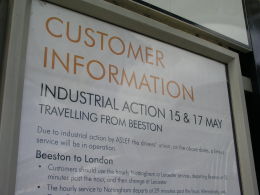Posted 31st May 2012 | 1 Comment
RMT abandons East Midlands strike ballot

THE RMT has cancelled its strike ballot over a pensions dispute at East Midlands Trains. Unite has also cancelled a strike which it had planned for the Jubilee weekend. The peace moves have been welcomed by East Midlands Trains, but Aslef has yet to comment following six one-day strikes by its driver members during May.
EMT said that from July, employees who are members of the final salary pension scheme will be entitled to the same benefits and save £500 a year in contributions following recommendations by independent experts. It said that the scheme trustees had agreed that extra contributions by the company and employees, which had been introduced to clear a previous deficit, were no longer required now the scheme is in good health.
Aslef had criticised the changes as 'cheapening' the plan and its benefits at a time when pensions are widely under threat. The RMT then started a ballot for industrial action in support, a development which EMT managing director David Horne described as 'unhelpful'. It is this ballot which has now cancelled and declared void.
The company's updated pension proposals will now be considered by the RMT Executive, with a recommendation to approve them.
David Horne of EMT has welcomed the developments. He said: "This is a positive step by the RMT and further welcome news for our passengers. We are pleased that we now have two trade unions who are considering our updated pensions proposals and who have stepped back from unnecessary industrial action."
Reader Comments:
Views expressed in submitted comments are that of the author, and not necessarily shared by Railnews.

Tony Pearce, Reading
Finances on the Railways are so devilshly complicated no-one knows what services are making profits or losses, and whether any 'fund' is in credit. Basically Network Rail is subsidised £5 billion ever year by the Governmant using Taxpayers money and that trickles out in all directions, enabling Train Operating Companies to make 'profits' and employees to be paid generous wages and pensions. During a recession it makes very good sense for Governments to invest in Rail infra-structure programs, re-opening lines and building flyovers. Not only does this keep skilled people from the Dole queue, it should reap benefits in years to come by increased usage and revenue. However if this money just ends up in Wages or Pensions then all the benefits are lost. The bottom line is that the Railways are either a loss-making industry or a necessary Social Service like the NHS, and the salaries and peniosn paid should reflect this reality.